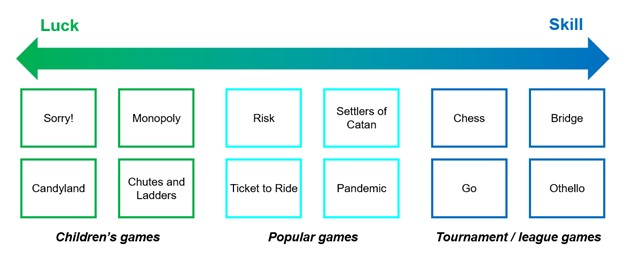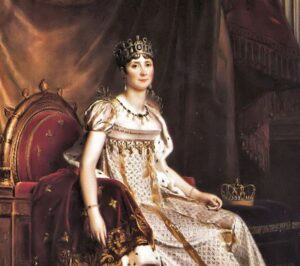With board games experiencing a resurgence in popularity over the past few years, we consider the question: what makes a board game good? While things like simple rules and epic artwork certainly play a role, the essence of a good board game is the way it balances luck and skill. Let’s explore why!
A quick note before we get started. Although some of the links below are affiliate links, no one asked us to put them in the article. We only put in links for games we enjoy!
The Role of Luck in Board Games
Luck is the element of a board game that influences a player’s success or failure because of chance instead of their own actions. Luck is important to have in board games for two reasons. First, it makes the game exciting and unpredictable. If you’ve ever played Monopoly, there’s nothing more thrilling than when you roll the exact number you needed to pass over the Boardwalk property that someone else owns. Second, luck allows beginners to have a chance to beat better players. In Settlers of Catan, for instance, a player can place their settlements in poor locations but still perform well with the right dice rolls. This makes the game open to everyone.
But if luck is the only thing that decides who wins, the game isn’t worth playing at all! You might as well pick a number out of a hat to decide the winner rather than going through the trouble of setting up the game.
The Role of Skill in Board Games
Skill is the element of a board game that depends on the players’ choices, where some choices are better than others even taking the element of luck into account. In a game like Risk, for example, a player uses skill to place his troops on the board and decide where to attack next. Even though success and failure depends partially on the dice rolls in the battle phase, some strategies will outperform others consistently when a large number of games are played. Skill is a critical element to any board game because it forces players to think, plan, and learn. Players get satisfaction from seeing themselves improve or unlocking a better way to play the game.
A game solely based on skill, however, is almost as bad as a game solely based on luck. If some players are better than others, the result of the game is a foregone conclusion. There’s no mystery as to who will win. Some heavily skill-based games, like Bridge, can also be difficult for beginners to learn.
Finding the Right Balance between Luck and Skill

Games that rely heavily on luck, like Candyland and Chutes and Ladders, are usually children’s games. After all, most children don’t have the capacity or interest to develop complicated strategies! On the other hand, games that rely mostly on skill, like Chess, tend to focus on tournaments or leagues more than casual game play. It’s no coincidence that the most popular games are those that find the balance between luck and skill.
Settlers of Catan: Relies on dice rolls (luck), but also planning where to put settlements and trading smarly (skill).
Ticket to Ride: Relies on drawing cards (luck), but also planning routes (skill).
Pandemic: Involves dealing with unexpected events (luck), but also needing to work with teammates to make good choices (skill).
Risk: Depends on dice rolls to decide battles (luck), but also placement of troops and path towards expanding into new territories (skill).
Conclusion
Striking the right balance between luck and skill makes for a great board game. Disagree? Let us know about it at [email protected]



